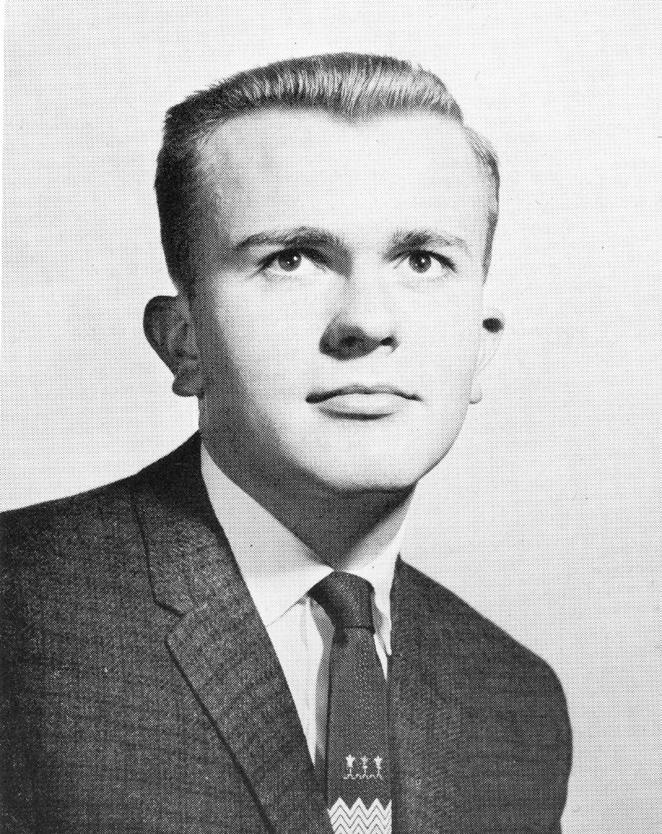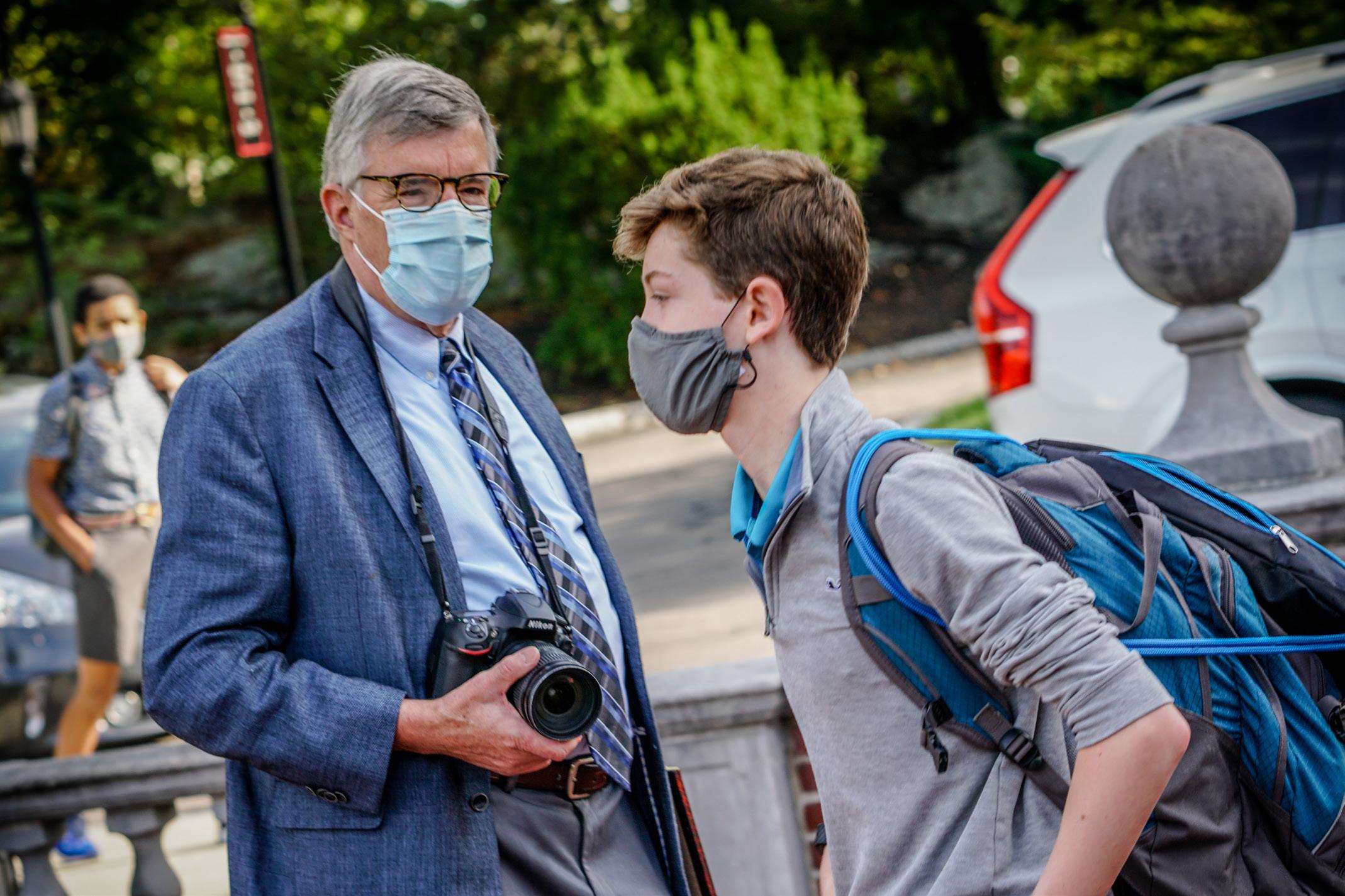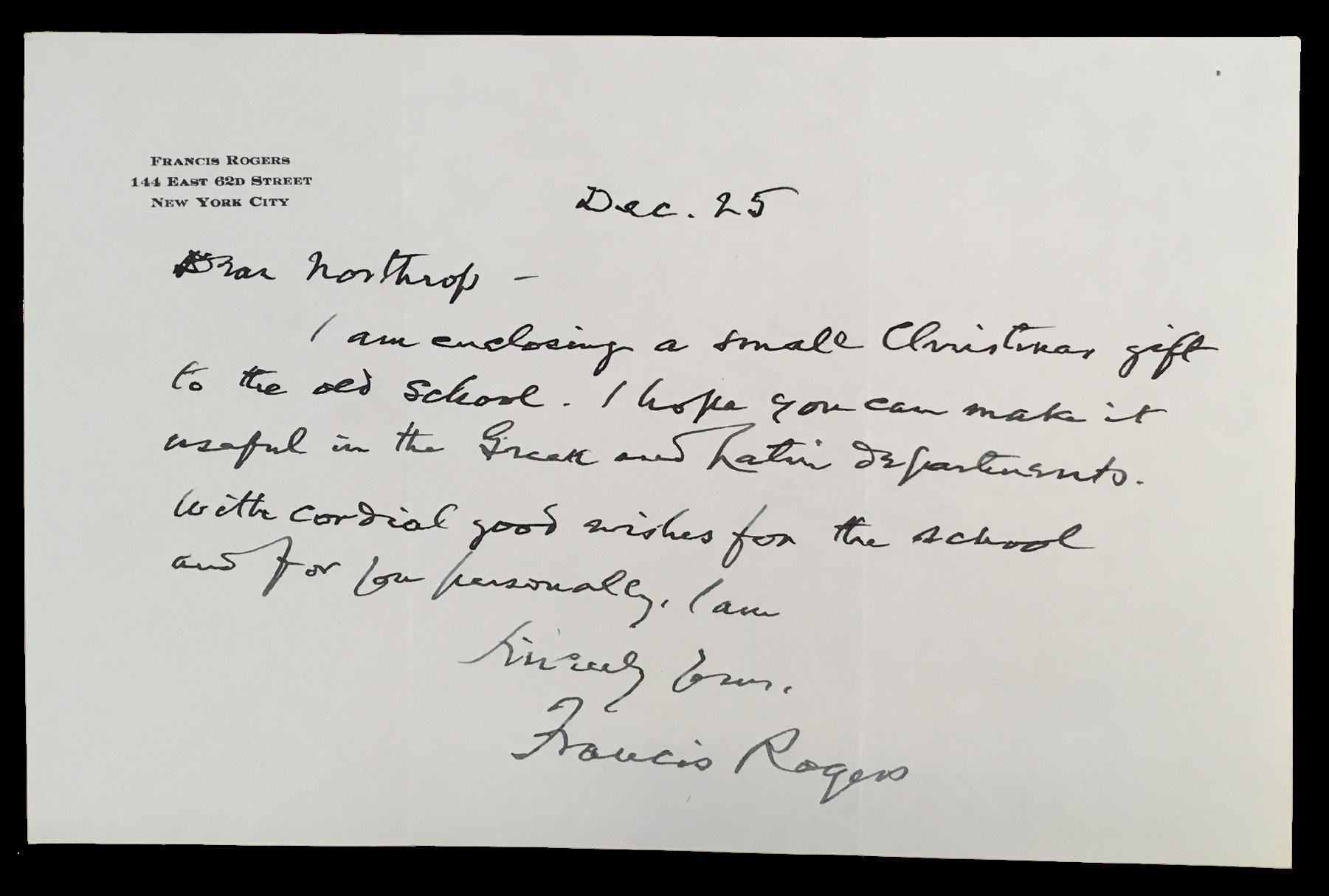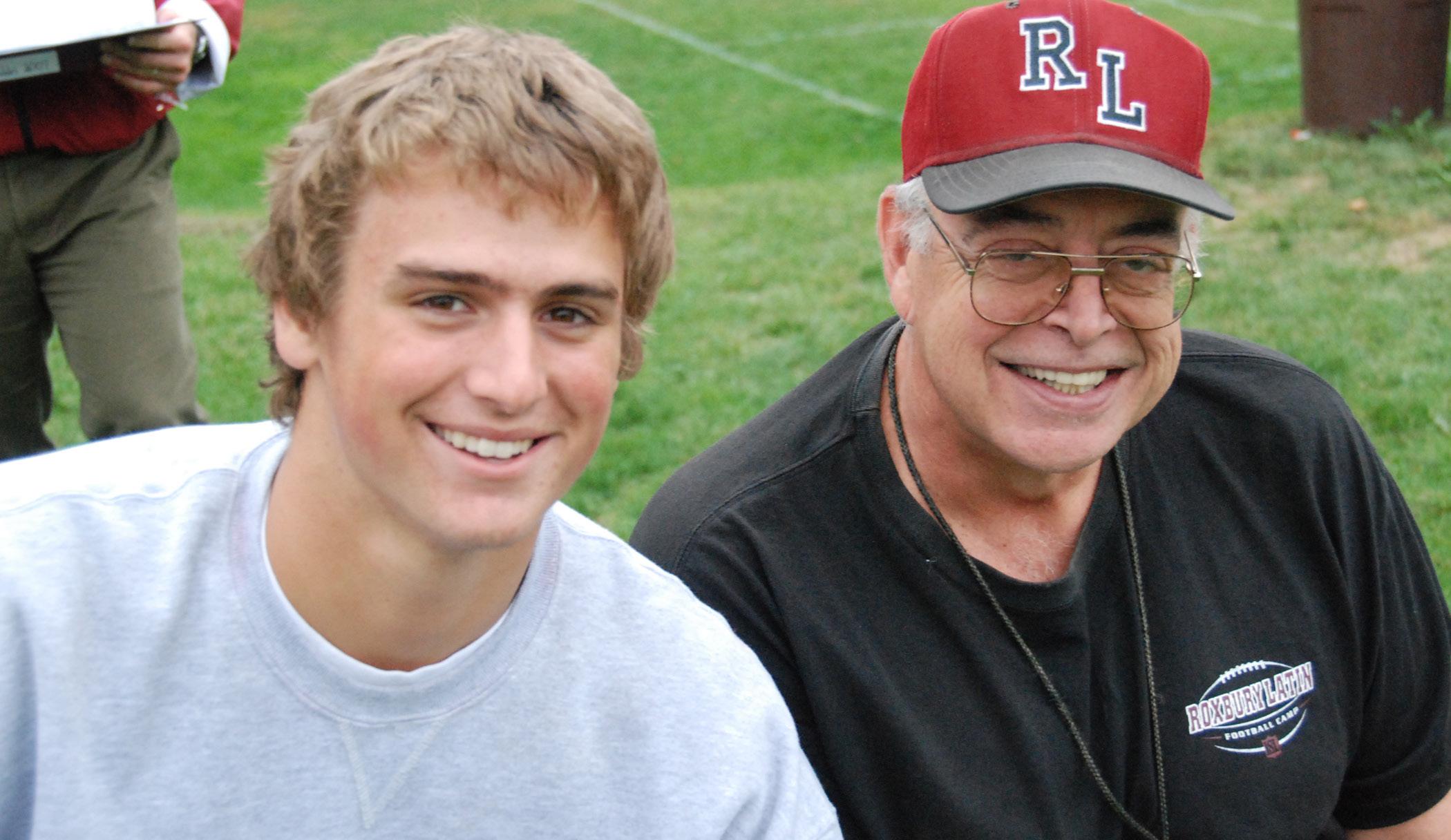
18 minute read
In Memoriam
volunteering at the Ric Rac Charity Thrift Store and Food Bank in Dawsonville and was a board member there for over 15 years. He is survived by his beloved wife of 60 years, Carol, his two daughters, and four grandchildren.
William “Bill” S. Callanan ’58 died on April 30, 2020 at the age of 79, after a long battle with Parkinson’s disease. He was born on November 21, 1940, the son of Frances (Shea) Callanan, a young widow. His father, Dr. Francis J. Callanan (Class of 1910 and school physician from 1921 to 1929), died tragically at the age of 44, seven months before Bill’s birth. Bill was raised by his mother and stepfather, Charles Curran, and attended the Angier School in Waban prior to gaining admission to Roxbury Latin.
Advertisement
As a student, Bill participated in a host of school activities. He wrote for Tripod, helped with the stage crew for plays, occasionally acted, and assisted as a scorekeeper and manager for several teams. In the winters, he played basketball and volleyball. As a senior, Bill also wrote for the Yearbook. While athletics were not Bill’s strongest endeavor, he participated in a variety of capacities. Famed RL wrestling coach and longtime master Bert Kelsey praised Bill’s “remarkable spirit” as a wrestler, and commended him for his presence on the mat for the sake of being on a team.
Headmaster Weed reflected in Bill’s college letter that he was a “serious student” who “[took] part in many activities with an interest and [made] a contribution.” In addition to Bill’s father being an alumnus, his uncle was also a member of the Class of 1909. Bill recalled that those Callanan predecessors were students under RL’s longest serving headmaster, William Coe Collar, and that Onsville Farnham, for whom the Farnham Room was named, was their Class VI Classmaster. Bill once wrote, “What a privilege it was to be admitted to Roxbury Latin and to be able to continue a family tradition.”
Like his father before him, Bill matriculated at Harvard College where he earned his AB in history in 1962. He then served in the United States Army for three and a half years. While in the army, he was stationed in Berlin as a translator of German. Upon his return to the United States, Bill worked briefly as a sales representative for a publisher in Boston and then spent a semester in Ohio as a secondary school teacher. He ultimately settled in Washington, D.C., where he earned his master’s in financial management from George Washington University. He worked for the federal government for more than 33 years, including the U.S. Civil Service Commission, and then the Library of Congress, where he served for many years as a benefits counselor and as a liaison to other federal agencies. In 1971 he married Mary Karen Grier, with whom he shared 49 years of marriage. Bill wrote in his 50th college anniversary report that “his greatest accomplishments have been his family and the opportunity to be of service to others.” Bill was a devout Catholic and held many intellectual interests. He amassed an encyclopedic knowledge on many subjects, particularly U.S. and European political history. As an amateur historian, he took up genealogy and traced his ancestry to the 17th century. He spoke French, German, and Spanish fluently and loved the arts, often attending concerts at the Kennedy Center and National Cathedral. Bill also was a lifelong fan of the Boston Red Sox. A private burial was held at Holyhood Cemetery in Chestnut Hill. In addition to his loving wife, Bill is survived by his three children, his siblings, a sister-in-law, and many friends and relatives, including six nieces and six nephews. He will be remembered by many as an exceptionally warm and kind man.

Robert “Bob” A. Magnuson ’61 died unexpectedly of a heart attack on December 24, 2020, at the age of 77. He
was born on August 24, 1943, the son of Elsa Holmgren and Carl Magnuson. He grew up on Howitt Road in West Roxbury and attended the Randall G. Morris School prior to gaining admission at Roxbury Latin.
Bob’s classmate and lifelong friend Phil Ferrara ’61 wrote, “While at RL, Bob was a solid student, ultimately achieving the National Merit Scholarship Letter of Commendation. Always competitive, he enjoyed success as a catcher for the RL baseball team. He loved a wide variety of school activities, and participated in the school play, played the trombone, and worked on the Tripod staff. Many happy hours of recreation with his friends were enjoyed at Billings Field in West Roxbury, whether ice hockey or baseball or basketball or tag football. Forever displaying a dry, quick wit, Bob was the master of humorous one-liners. Along with that, his classmates were all introduced to Bob’s seemingly infinite storehouse of sports trivia. No matter the obscure fact or statistic, Bob seemed to have the answer. And, all of that before the Internet!” As a student, Bob also played soccer, tennis, and basketball at various points and sang for the Glee Club. Headmaster Weed described Bob in his college letter as “A fine boy in all ways… he is always willing, well mannered, and respected for his complete integrity and conscientious endeavors.”
Bob matriculated at Tufts, where he earned his BA in economics in 1965. He later attended Boston University where he earned his MBA in 1968 with a focus on quantitative methods. Bob’s studies and interest in finance and accounting led him to a long career with Northwest Orient Airlines. During those years he resided in Minnesota, New York, and Tokyo. He ultimately served as vice president of finance and treasurer of the corporation. He was responsible for union negotiations in Asia and North America. Bob was quite proud that he completed his career with this one employer.
Bob was an avid sports enthusiast, loyal to all of the Boston professional sports teams. Early retirement brought him to Cape Cod where he occupied his time with regular golf matches, photography, and planning future adventures. (He often quipped that he only needed 24 hours’ notice to go anywhere in the world.) Bob established an annual golf tournament that eventually grew to involve as many as fifty friends each year. The tournament has been played near Gilbert, Minnesota, every summer for more than three decades, providing enjoyment and camaraderie for his many friends while also supporting local charities with a large portion of the proceeds. Bob, affectionately known as the “Golfmeister,” will long be remembered. He was known for his eccentric sartorial splendor; golfing in bright, Red Sox knickers, unmatched socks, and a Roxbury Latin hoodie was not unusual attire. Golf, cycling, card playing, and cigar smoking were among his hobbies. His genius at crossword puzzles and seemingly infinite knowledge of trivia was renowned and astounding. He leaves friends scattered all over the world.
In addition to his many friends, Bob is survived by his sister, a nephew, and his extended family. A memorial golf match in Bob’s memory will take place when possible, complete with cheap cigars and spicy Bloody Marys on the menu. Bob’s friends and family know that he awaits them all on the 19th tee.
David “Dave” F. McCarthy ’68 died on May 9, 2020, at the age of 70. He was born on April 8, 1950 in Boston and was raised in Dedham. At Roxbury Latin, Dave played football, soccer, and lacrosse. He was president of the Outing Club and served on the stage crew. In Class I, Dave was co-captain of soccer, co-captain of lacrosse, vice president of his class, Student Action Committee member, and part of the school Business Committee. In his college letter, Assistant Headmaster and College Advisor Warden Dilworth wrote, “All of David’s teachers agree that he has a great deal of intellectual ability coupled with an independent spirit… His Greek teacher wrote that David was ‘a sheer delight in class and full of insights which can spark a class.’ He is well respected by his classmates who have elected him their vice president. He has the potential to be a great asset to any college.”
Dave matriculated at Hamilton College where he continued his study of the Classics and earned his BA. As a senior at Hamilton, he met Carol Kennedy,

whom he later married and with whom he spent the rest of his life. Dave later attended Boston College Law School, where he earned his JD at the age of 36. A newly minted lawyer, he and his wife moved to Binghamton, New York, where they made their home and developed countless friendships over the years.
Dave worked as a litigation attorney for Levene, Gouldin & Thompson for thirty years. He also coached Mock Trial for both Binghamton High School and Seton Catholic and coached for Two Rivers Soccer Club. His team appreciated his creative approach. They will remember his sense of humor. He loved the outdoors and helped beautify his town, landscaping the West Side of Binghamton. He collected push lawn mowers, with an impressive assortment available for viewing. Dave was an avid runner, easily recognized for his white gloves, and he successfully completed three marathons. Dave was quick witted, a terrific host of many parties. He was an active member of the Ancient Order of Hibernians, where he was known as a bartenderextraordinaire. He leaves his many friends with fond memories.
Dave was predeceased by his brother, two brothers-in-law, two nephews, and a grandson. He is survived by his wife, three children, two sisters, and eight grandchildren. Dave was also the loving uncle to many nieces and nephews. A private funeral Mass was offered at St. Patrick's Church, Binghamton, followed by burial at Calvary Cemetery, Johnson City. Timothy “Tim” F. Bilodeau ’68 of Hull died peacefully on January 9, 2021, at the age of 70. He was born on July 10, 1950, the son of Jane McLaughlin and Thomas Bilodeau. Tim grew up in Milton and summered in Hull with his family as a boy.
As a Roxbury Latin student, Tim played baseball, football, and basketball. He acted in the play and was vice president of his class as a freshman. In his sophomore year, he also sang for the Glee Club. Later he co-captained the football team, captained the baseball team, and participated on the Student Council. He was widely considered to be one of the best RL athletes of his generation. As Tim was applying for college, Headmaster Mayo-Smith wrote: “Tim is a very capable, interesting boy. He has a good mind and uses it efficiently and effectively, so that his record is consistently good. Indeed, his efficiency in learning and producing leads one to believe at first that he is primarily an achiever, that is, he works to achieve certain results and not to satisfy any intrinsic intellectual interests. This is misleading, for he does have genuine intellectual interest.” He continued, “I recommend Tim highly as a college candidate, with work habits and basic curiosity to benefit greatly from a college education, not to become a scholar but to become a very effective person.” Headmaster Mayo-Smith’s words were prophetic indeed; Tim went on to lead a life as a “very effective person” in the years that followed.
Tim matriculated at Harvard, where earned his AB in economics in 1972. There he played football and captained the baseball team. After college, Tim spent a year with Danny Danforth ’67 doing a teaching fellowship in Greece— an experience from which he “barely escaped with his life” after protesting against the Greek military regime, which left him imprisoned for a short stint in 1973. Upon his return to Boston, Tim attended Harvard Divinity School, where he earned his master’s degree. Religious education and administration became his passion for the subsequent six years. In 1981, Tim relocated to California and attended Stanford Business School. Recently, Tim received an honorary doctorate degree from Canisius College.
Upon graduating from business school, Tim began working for a healthcare consulting firm, and spent the subsequent years doing financial and strategic planning studies for hospitals before deciding to become an entrepreneur. In 1988 Tim founded his own firm, T. Bilodeau Associates, and worked as a headhunter for healthcare companies, consulting firms, and hospitals. In 1992 he became the executive director for Por Christo, a nonprofit organization that sent medical teams to Ecuador. He also served as special projects director for the Catholic Relief Service. In 1997, Tim founded Medicines for Humanity—his most significant project yet—to attack the issues of child mortality

in impoverished communities around the world. After learning that millions of children were dying from preventable causes, Tim set his mind to righting this wrong and used his gift of storytelling to unite his friends and family behind his vision. Together with incredible health care partners, Medicines for Humanity continues to provide critical health care services to more than one million children and mothers each year in some of the world's most underserved places. Tim called himself the luckiest man in the world for being able to devote his life to this essential work. Thanks to Tim’s infectious enthusiasm and pure sense of service, Medicines for Humanity became a favorite cause of RL’s boys, faculty, and staff. Tim’s life was filled with love, laughs, and adventure. He was a man of great ability and greater purpose. He deeply loved his family and friends and was incredibly grateful for their commitment and support of his life’s work. Beyond his professional work, he loved sports and coaching and was a fixture on the sidelines and in the bleachers at his sons’ games, where the creativity and consistency of his referee heckling became the stuff of legend. He had a razor-sharp wit and was ready with a joke for every circumstance. All those who knew him will recall his infectious laugh. His family recalled, “To spend time with him was to get caught in fits of laughter that would consume the entire room. His trademark chuckle and unmistakable voice will be sorely missed.” Tim loved the natural world. He was an avid fly fisherman and, later in life, a keen bird watcher. He enjoyed competition and conversation, and his greatest joy was spending time at his home on Nantasket Beach with his family.
Tim is survived by his cherished wife, Cathy Burger, his four sons and their wives, six grandchildren and his sister, his father and mother-in-law, and a large extended family, countless friends, and his family dog. In addition to his parents, Tim was predeceased by a brother and sister. Tim’s legacy of saving the lives of some of the world’s most vulnerable children lives on through Medicines for Humanity and all of the people he inspired to make a positive difference in the world. //
A Simple Gift, a Lasting Impact
The Thomas Bell Society honors those members of our community who have made a planned gift to Roxbury Latin and have indicated to the school that they have done so. Planned gifts provide flexibility and possibility for those donors who are eager to support the ongoing legacy of a Roxbury Latin education in creative, meaningful, and affordable ways. Here are some easy ways to make a planned gift:
1. A Bequest: Include a gift to RL in your will or trust. Make your bequest unrestricted or direct it to a specific purpose. You can indicate a specific dollar amount, a particular asset, a set percentage of your estate, or the residual amount of your estate.
2. Charitable Gift Annuity (CGA): Make a gift now with cash or appreciated securities, receive tax benefits, and enjoy guaranteed income for the rest of your life.
3. Memorial Gifts: In addition to these planned gifts, many families choose to designate Roxbury Latin as a charity to support in the name of a deceased loved one (in lieu of flowers). Often the deceased alumni and parents have made it clear in their plans that RL is the memorial destination of choice. By designating Roxbury Latin as the charity of choice upon their passing, they are providing immediate and meaningful support to the boys, faculty, and program, and honoring their connection to the school. Families of the honored deceased are informed of those thoughtful memorial gifts.

As is always the case when seeking legal and financial advice, we recommend you speak with your attorney or estate planner to learn about the many benefits and possibilities of philanthropic estate planning. More information is also available at roxburylatin.plannedgiving.org. There you will also find information about other ways to make a gift to Roxbury Latin that will cost you nothing during your lifetime and that will provide crucial support for the school in perpetuity. If you have already made provisions for Roxbury Latin in your will or estate, or if you have questions about making a planned gift to Roxbury Latin, please contact Dave Cataruzolo, Director of Alumni Affairs and Planned Giving, at david.cataruzolo@ roxburylatin.org or 617-477-6314. We would like to show our appreciation for your commitment and welcome you into the Thomas Bell Society.

It’s the Simple Things in Life that Keep Us Going
by MIKE POJMAN
I don’t know about you, but the pandemic has been taking its toll on me. I knew it when facial recognition didn’t know it was me when I powered up my iPhone this morning. These are tough times.
Oddly, however, I’m still feeling upbeat—even optimistic—in the midst of all this mayhem, and for the most part, so are my students. Roxbury Latin boys are known for their resilience, for their adaptability in the face of challenges and uncertainty. It’s in their DNA. It’s also in the Student Handbook. Recently, I spent a little time contemplating this wonderful aspect of their personalities, and I’ve come to the conclusion that beyond their constitutional sturdiness, there is something more fundamental—even simpler—that carries them through their day. And that’s when it hit me. It’s the simple pleasures that provide the spiritual comfort food that keeps these boys emotionally nourished and steady. To test my theory, and to satisfy my curiosity, I’ve been interviewing boys and compiling a list of their simple pleasures. “So how about it?” I queried boys at random from every grade level. By the looks on their faces, I could tell they thought the question itself was random, but most humored me with an answer—some immediately, others after a moment or two of reflection. Their answers were as unalike as they are, and in many cases just as charming. So here goes. (I couldn’t resist adding a few editorial comments along the way.)
My simple pleasure is:
• “Feeling the salt in my hair after a swim in the ocean.” • “A piece of dark chocolate and a glass of whole milk.” • “A catnap on the window seat with my dog curled up beside me.” (Right out of Norman Rockwell.)
• “Making a To Do list and checking it off at night.” (That’s on my To Do list.) • “Reading a book by flashlight under the covers.” (Or perhaps, for us Ohioans, a dime novel hidden in the corncrib.) • “Messing with my internal clock by staying up until 2 a.m. and sleeping until noon.” • “When my dog wakes me up at six in the morning.” • “Playing my guitar.” • “Doing pullups in the doorway.” • “Any time Netflix adds a new season of my favorite show.” • “Sipping eggnog with my family at the holidays.” • “Cooking spaghetti with my mom.” (Chef Boyardee!) • “A crisp high five.” (Here’s longing for a return to normalcy.) • “Finding loose change between the sofa cushions.” • “Going for a drive on the day I got my license.” (With the windows down and the radio blaring.) • “Shooting baskets with my AirPods on.” • “Listening to a song that matches my mood.” • “Playing video games with my friends on a Friday afternoon.” • “The sound of boots on the trail during a late fall hike, sipping a mug of hot chocolate while sitting in the snow, lying in a grassy field on a warm spring day, and going for a run at sunset on a summer evening.” (This guy’s a man for all seasons.) • “Taking a hot shower and climbing under the covers at the end of a tough day.” • “Having a quiz cancelled unexpectedly.” (Especially when he hasn’t studied.) • “Making 3D models during woodworking class.” • “Finding a surprise cookie in my lunch bag.” • “Playing a sneak game of Minecraft during an online
Physics exam.” (Which was the better score?) • “Closing the tabs on my browser when I’ve finished my homework.” • “Making it to the weekend!”
I don’t know what to think of these last few, and I was reluctant to ask:
• “When a pair of dice roll a 2 and a 3.” • “Eating peanuts with the shells on.” • “Packing and unpacking my hockey bag.” (That boy also enjoys four-day-old fish.) • “A good sneeze.” (Socially distanced, of course.) • “Watching the faculty struggle with technology.” (As
Classics master emeritus Ned Ligon was fond of saying,
“All nice boys at Roxbury Latin….”)
And what are my simple pleasures, you ask? (You did ask, didn’t you?)
• A Jamocha shake at Arby’s. (Don’t knock it until you’ve tried it.) • A stroll through downtown Natick. (Add to that a medium decaf from Dunkin for the walk home.) • Counting my “likes” on social media. (For obvious reasons, I’ve given up on social media.) • An email from a long-lost alum. (Here’s your chance, boys!) • Grading Fifthie English essays on my iPad. (Yes, really!) • Watching a pro hockey game and having a tooth pulled on the same day. (Not really.) • Dashing off a fluff piece like this one for the Newsletter. (Any time I can make it past the censors.)
No doubt you have your own list, and we could Zoom to compare notes. But maybe let’s just add one more entry to both our lists and let it go at that. So write this down: The ultimate pleasure for me is imagining that reading this trifle is actually a simple pleasure for you. Wuddaya say? Hey, a man can dream. //





